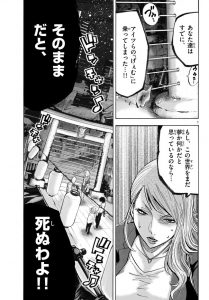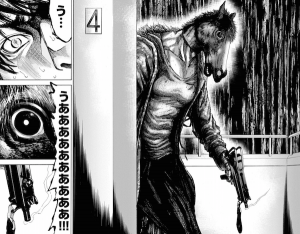Imawa no Kuni no Alice
Haro Aso (writer and illustrator)
Shogakukan
2010–2016
[Content warnings for this one include: suicide, (foiled) sexual assault, people dying, people being grievously injured or dismembered.]
In today’s media, the book Alice in Wonderland is as much a motif as it is a piece of media on its own, inspiring works like Marissa Meyer’s Heartless, the Syfy series Alice, and elements of the TV series Lost. Japan, likewise, has found the whimsical, bizarre elements an inspiration as well, creating works from the comedic Miyuki-chan in Wonderland to the, uh, not comedic Alice in Murderland. Imawa no Kuni no Alice (今際の国のアリス; Alice in Borderland) skips over the smiling cats and tea parties and digs more into the meat of what a “wonderland” is.
The Alice of these Borderlands is Ryouhei Arisu (yes, his last name is literally Alice), an unmotivated ne’er-do-well high schooler wiling away his days with his friends Chouta and Karube and reminiscing about what he might want to do with his life. The question becomes more of a pressing issue when the three of them are unexpectedly drawn into a Tokyo that seems set in the future, with wilderness growing in the cracks of a vanished civilization. Things get better (not better) when they discover their stay in the Borderlands has a time limit: if they don’t participate in potentially-deadly “games,” they will die. They and the other people brought to the Borderlands must survive challenges which throw everything from wild animals to collapsing man made structures, from firepower to literal fire power, at them. They also have to survive perhaps the most dangerous threat: each other.

“Borderland” is the translation usually used for “imawa no kuni,” in reflection of the source material’s Wonderland, but a closer translation might be “the land of the verge of death” or “land of one’s dying moments.” Death and loss, life and its meaning, are both recurring themes through the series. Each character in the large cast reflects on it differently, giving a multifaceted answer to a complex question. That large cast is effectively managed by killing people: sometimes expected, sometimes not, sometimes meaningless, sometimes as a culmination of their choices. While the story taken as a whole isn’t simply as karmic as “good guys live, bad guys die,” it’s not a nihilist take. Death is presented much like it is in reality—often a consequence, but sometimes random and completely unfair.
At the center of this, Arisu is not quite your typical shonen protagonist—while he has moments of brilliance, he also shows plenty of weakness, revealing insecurity and a young man who hasn’t quite grown into adulthood. While I enjoyed his character, it’s that breadth of characters as a whole that really makes the series shine. The Borderlands makes no distinction as to who enters it, from middle schoolers, musicians, and lawyers to combat veterans, car mechanics, and gang members. Like Arisu, they bring their own problems with them: slipping careers, PTSD, frustrations with reality, difficulties in coming out, the inability to trust. Flashbacks are used very effectively, showing how their pasts inform their present actions. And while many of the games and situations pit person against person, there are no bad guys. Even the scummiest of the scummy are presented with context that, while it may not make us sympathetic, may at the least make us curious. And when the main narrative becomes too much or needs a break, we get even more on these side characters as pseudo-protagonists, making them heroes for a few chapters, weaving their narratives toward the main storyline seamlessly.


Imawa no Kuni no Alice is one of those messy stories of humanity I love—things are not simple, it’s not good/bad but us/them, and there is no Aesop that makes the world make sense. But “messy” doesn’t mean it’s easy to write—it’s a fine balance between making a messy but coherent story and a nonsense “life sucks” tale. Like the work it was inspired by, Imawa no Kuni no Alice takes the nonsense of reality and attempts to frame it in a fictional story that gives structure and satisfaction to its readers without downplaying the bizarreness that is the unfair truth of our world. In a well-told Wonderland, they may all be mad here, but it’s not without method. And by removing the familiar aesthetics and dressings of its source material, Imawa no Kuni no Alice creates a grown-up Wonderland that tries to make sense of our world by exploring it in another.

